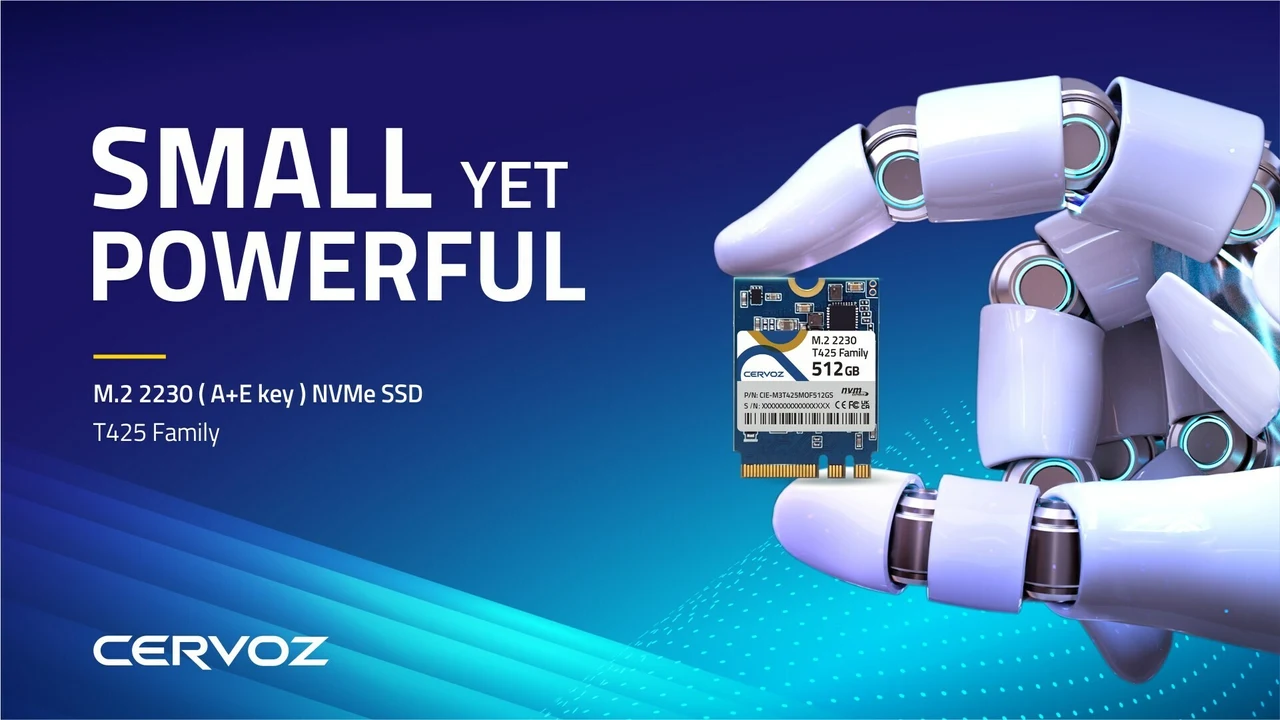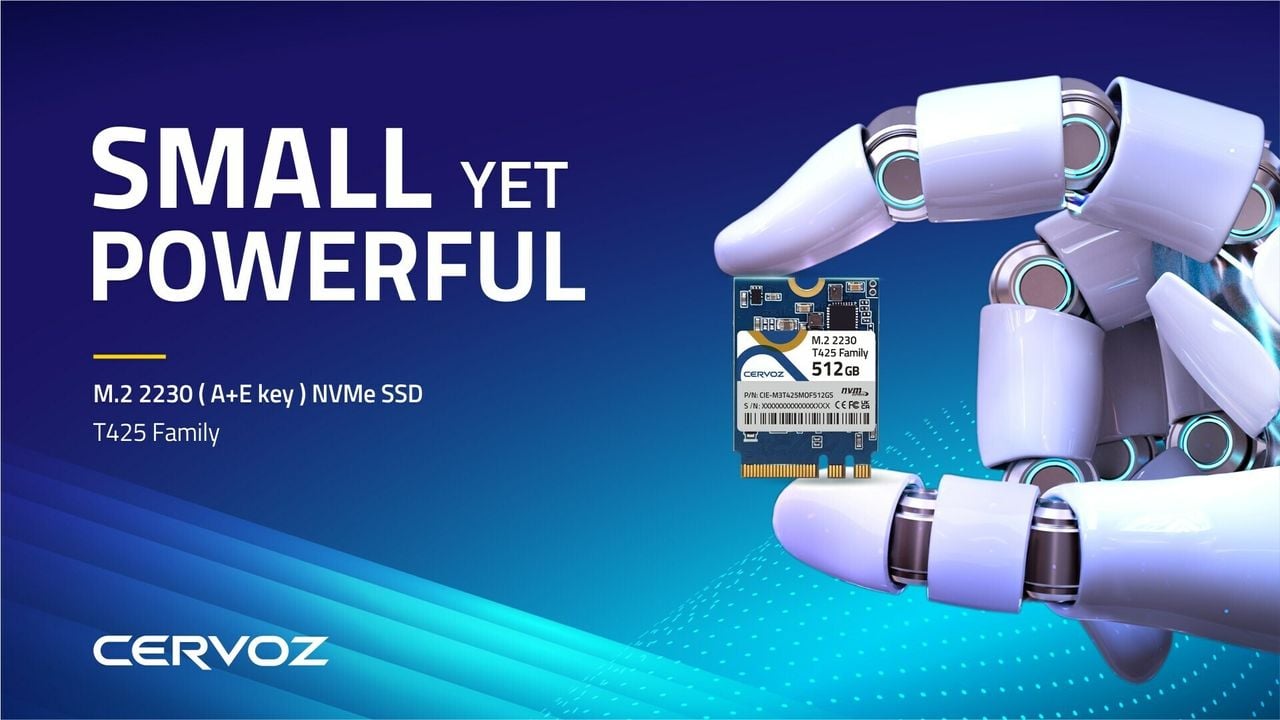
Cervoz Technology has recently unveiled its new storage solutions for edge AI applications with the introduction of the T425 SSD. This compact and powerful storage device is designed specifically for fanless embedded PCs and motherboards, which are increasingly used in edge AI applications. The T425 SSD’s compact design, high computing power, and diverse I/O options make it a potent solution for multimedia requirements within the constraints of small form factor PCs.
SSD Edge AI storage
One of the T425 SSD’s most notable features is its wide temperature operating range. Capable of functioning efficiently from -40°C to 85°C, it offers a level of resilience that is critical in edge AI applications, where devices may be exposed to extreme conditions. This robust temperature tolerance is complemented by the T425 SSD’s compliance with PCIe Gen 3 and NVMe 1.3 across two PCIe lanes, ensuring compatibility with a wide range of devices.
The T425 SSD is available in the M.2 2230 (A+E key) form factor. This compact form factor is particularly suitable for ultra-compact PCs with space constraints, a common issue in edge AI applications. With the increasing importance of optimizing data storage within limited space, the T425 SSD’s compact design presents a significant advantage.
The T425 SSD does not compromise on performance despite its compact size. It offers sequential speeds of up to 815 MB/s for reading and 760 MB/s for writing. This high-speed performance is available across storage capacities of 64 GB, 128 GB, and 512 GB, offering flexibility to suit a range of storage requirements.
What is Edge AI ?
Edge AI refers to the deployment and use of artificial intelligence algorithms directly on local devices, such as smartphones, IoT devices, or edge servers, rather than relying on cloud-based services. This approach offers several advantages and implications:
Background Context:
- Computational Distribution: Traditional AI relies heavily on cloud computing, where data is sent to centralized servers for processing and analysis. Edge AI shifts this computation to the device itself.
- Real-Time Processing: Edge devices often need to process data in real-time or near real-time, especially in applications like autonomous vehicles or industrial automation.
Key Aspects of Edge AI:
- Latency: By processing data locally, Edge AI can significantly reduce latency compared to cloud-based solutions. This is crucial in applications where real-time analytics and immediate decision-making are essential.
- Privacy & Security: Processing data locally means sensitive information doesn’t need to be sent over the network, reducing exposure to data breaches and enhancing privacy.
- Bandwidth: Transmitting large volumes of data to the cloud can be bandwidth-intensive. Local processing reduces this demand, which is beneficial in bandwidth-constrained environments.
- Reliability: Edge AI can operate independently of network connectivity, ensuring functionality even when offline or in unstable network conditions.
Applications:
- Autonomous Vehicles: Processing sensor data directly in the vehicle to make immediate driving decisions.
- Smart Manufacturing: Local sensors in machinery can predict maintenance needs or optimize operations without relying on a central server.
- Healthcare Devices: Wearables that monitor health metrics and provide instant feedback, analysis, or emergency alerts.
Trade-offs:
- Computational Power: Edge devices often have less computational power than cloud servers, which can limit the complexity of the algorithms used.
- Energy Consumption: Running AI models on small devices can be power-intensive, impacting device battery life.
Edge AI is a strategic approach in scenarios where speed, privacy, and bandwidth are critical, despite some trade-offs in computational power and energy usage. Its growing importance is evident as IoT and autonomous technologies continue to evolve.
The SSD can be installed in the M.2 2230 A and E key socket, initially designed for Wi-Fi/BT connectivity on the motherboard. This allows the T425 SSD to bypass storage and physical space limitations, providing an innovative solution to the challenges of data storage in compact devices.
Cervoz T425 SSD
The T425 SSD also boasts several advanced features designed for demanding environments. It features End-to-End Data Protection, ensuring the integrity of data from the point of origin to the point of destination. This is particularly crucial in edge AI applications, where the loss or corruption of data can have significant consequences.
In addition to data protection, the T425 SSD uses SLC write cache technology for swift performance. This technology allows the SSD to perform write operations at high speed, enhancing overall device performance. Furthermore, the T425 SSD has Dynamic Thermal Throttling capabilities. This feature allows the SSD to handle heat generation and maintain peak performance under heavy workloads, ensuring reliable operation even in demanding edge AI applications.
The T425 SSD by Cervoz Technology is a compact, powerful, and resilient storage solution designed to meet the demands of edge AI applications. Its wide temperature operating range, high computing power, and advanced features make it an excellent choice for small form factor PCs. With its M.2 2230 (A+E key) form factor and ability to bypass storage and physical space limitations, the T425 SSD is well-positioned to address the unique challenges of data storage in edge AI applications.
Filed Under: Technology News, Top News
Latest timeswonderful Deals
Disclosure: Some of our articles include affiliate links. If you buy something through one of these links, timeswonderful may earn an affiliate commission. Learn about our Disclosure Policy.

